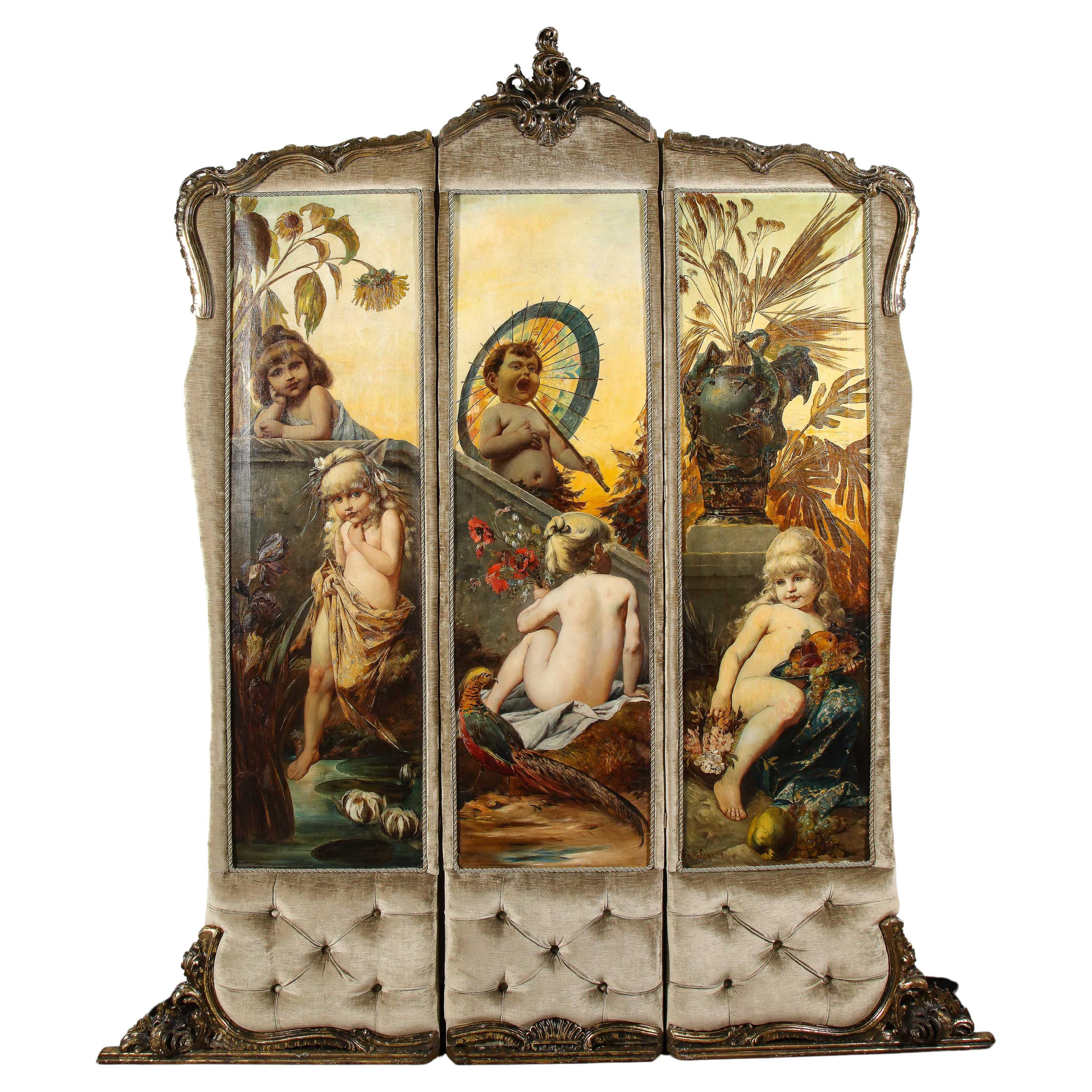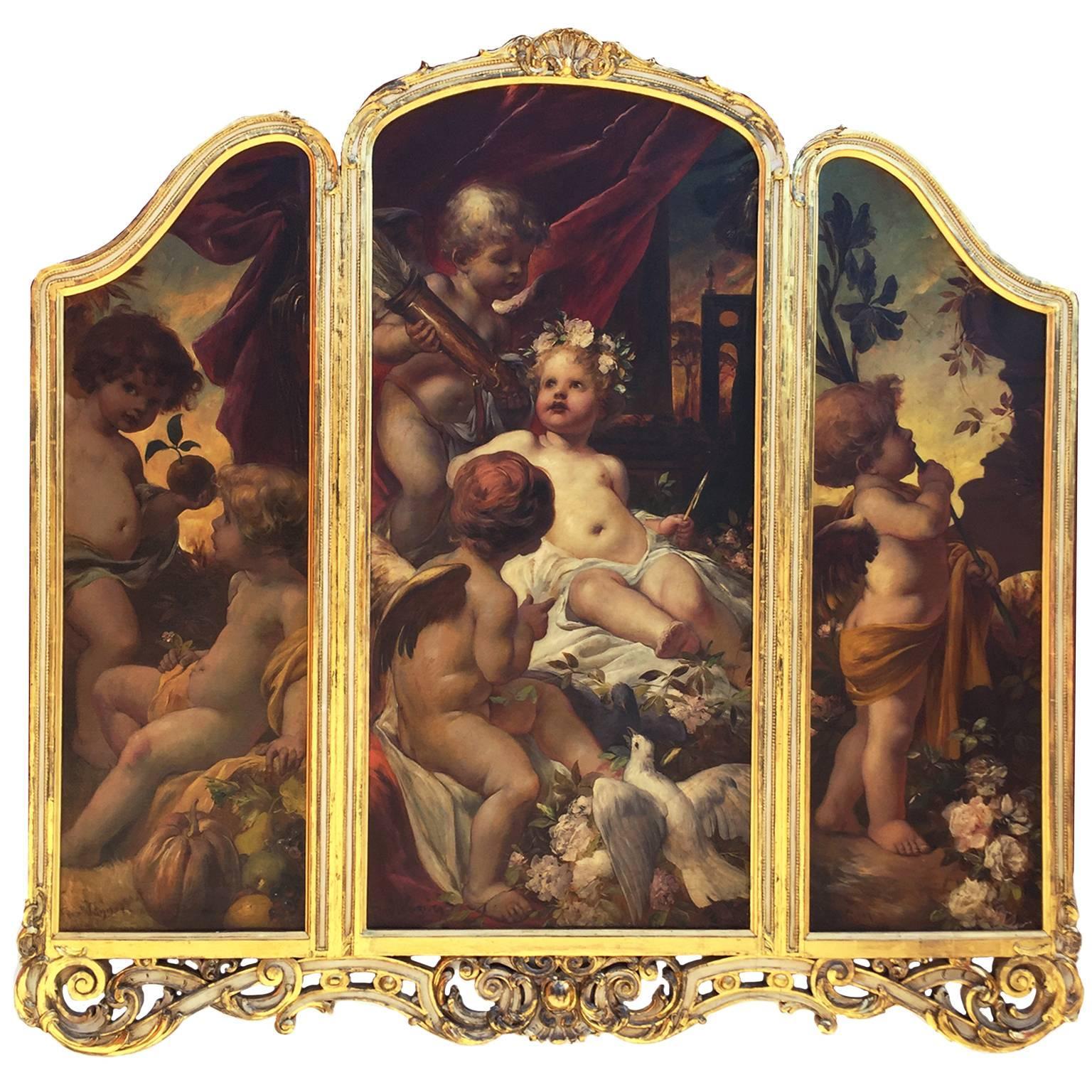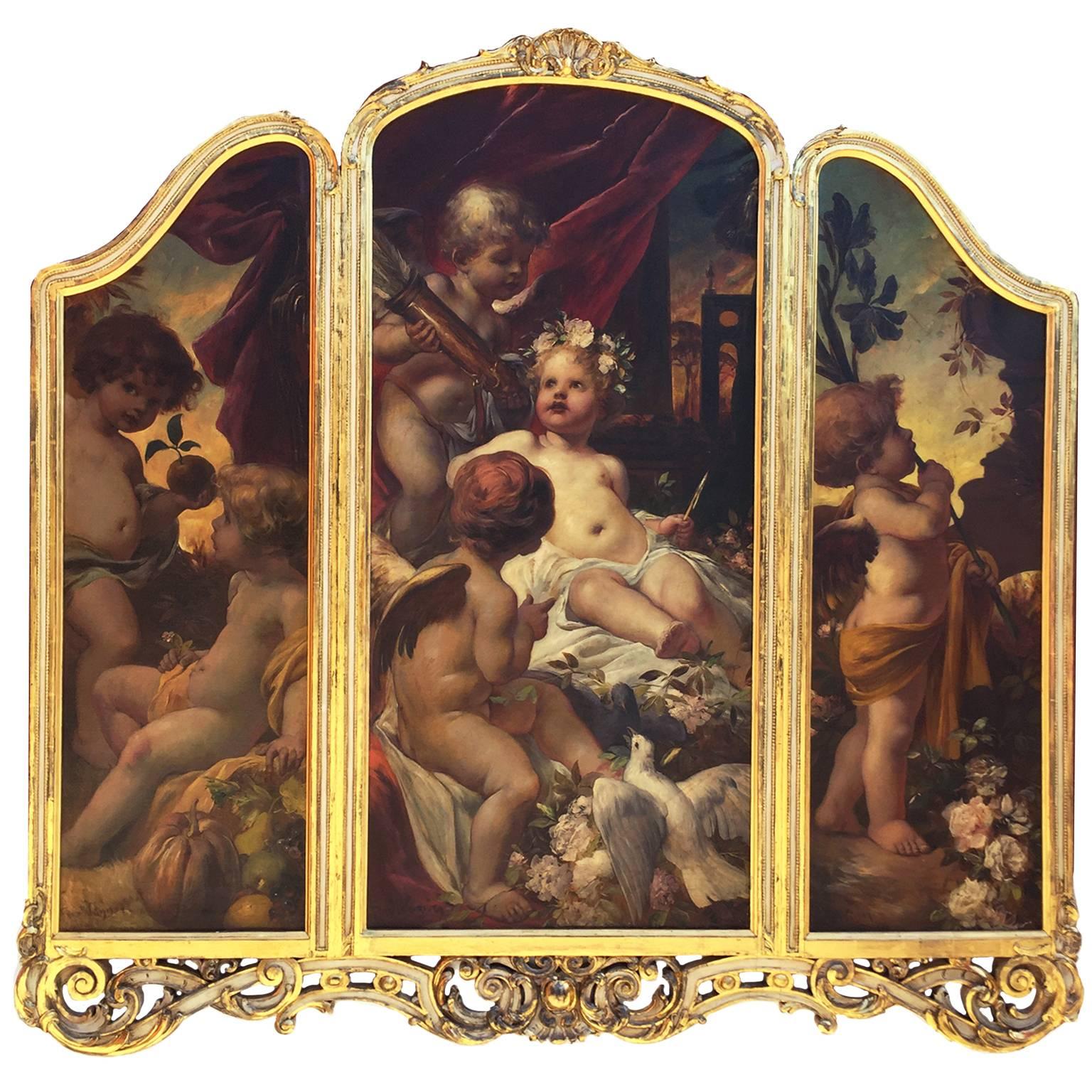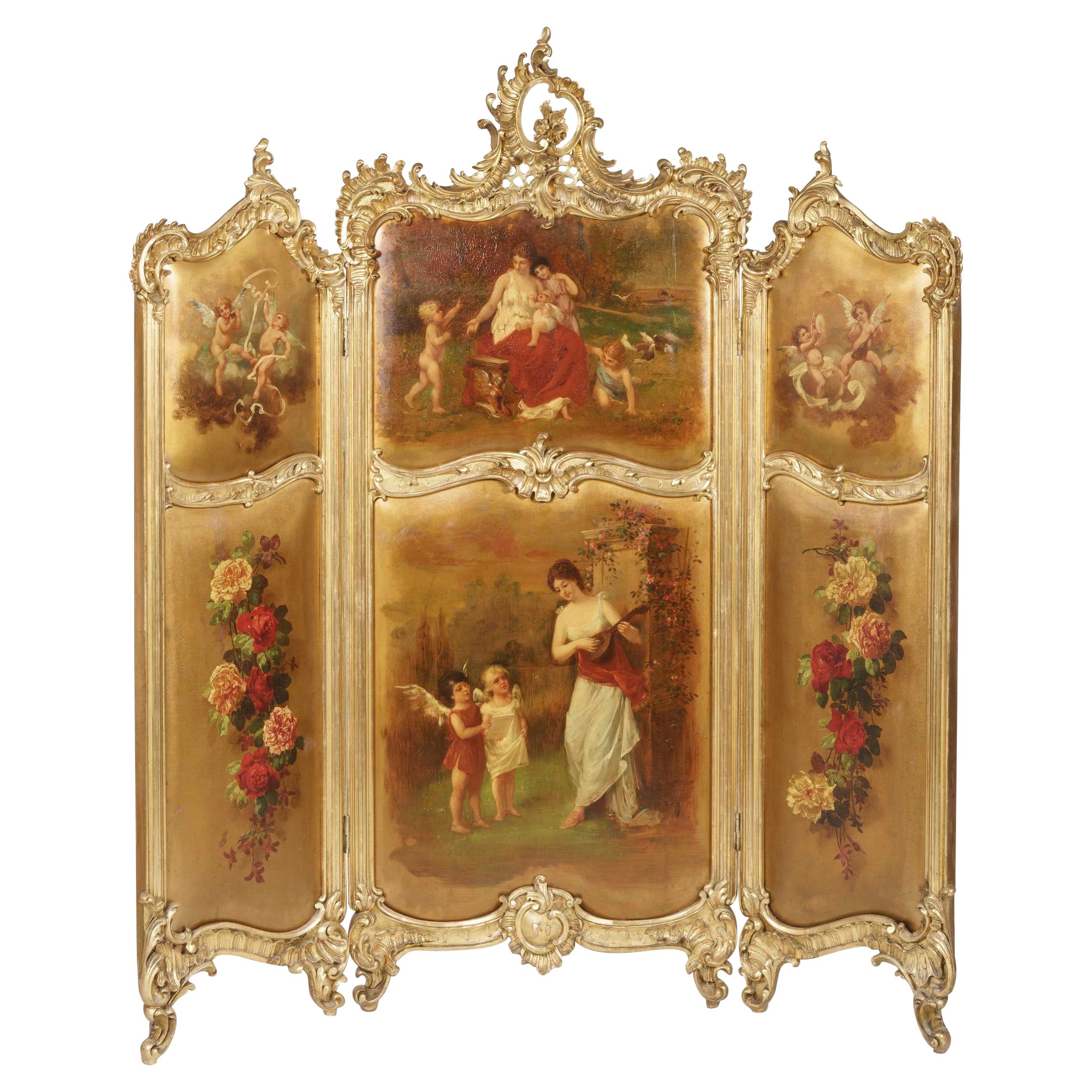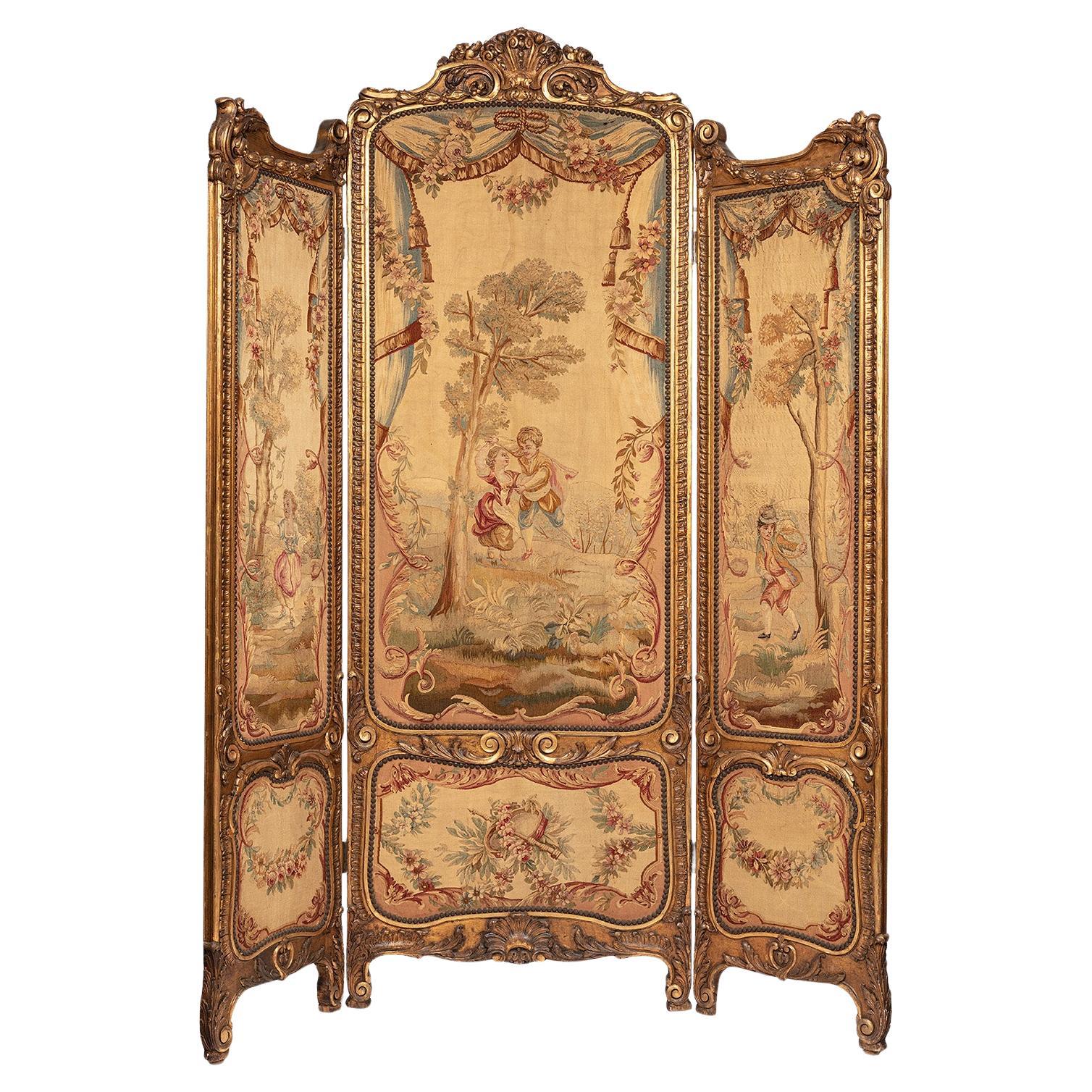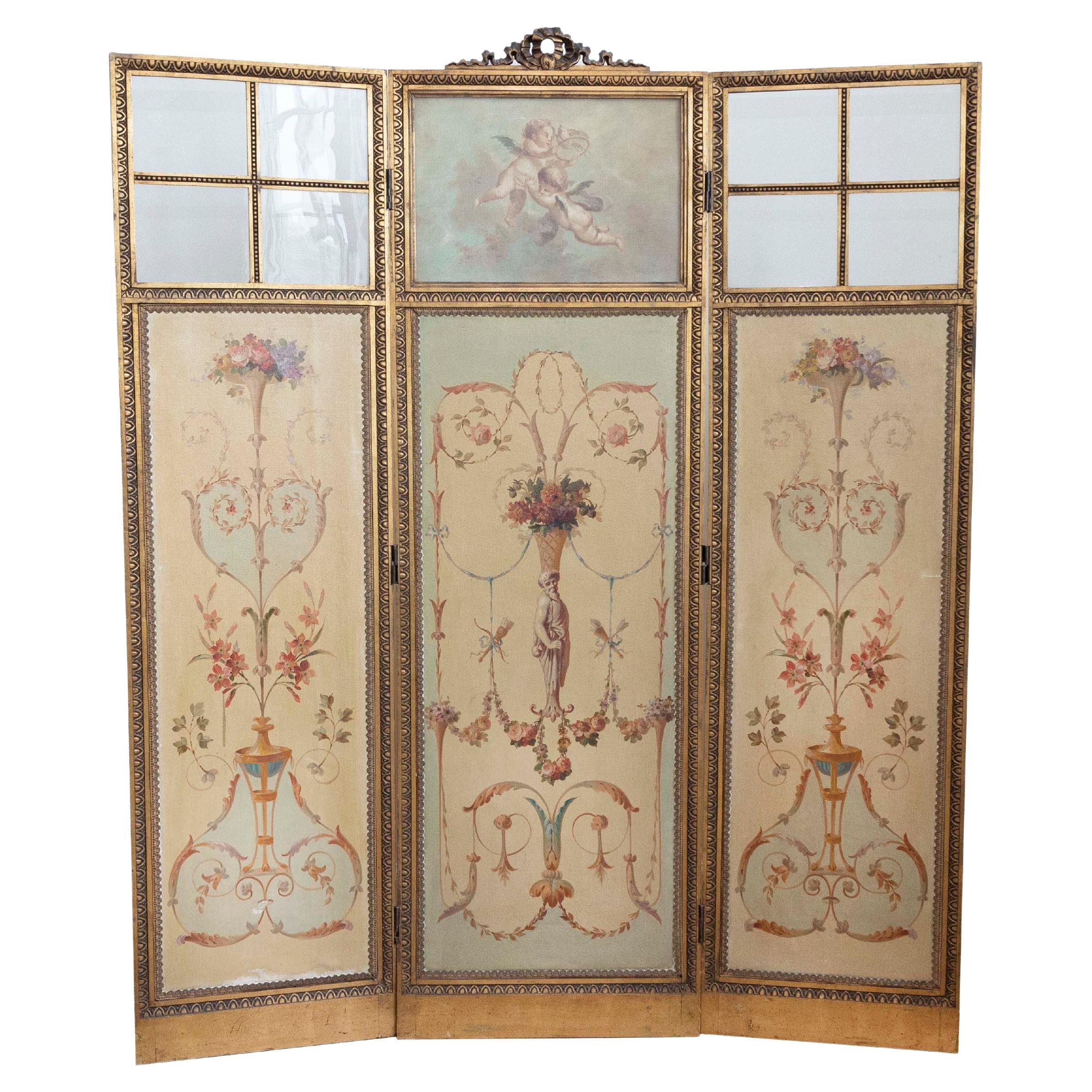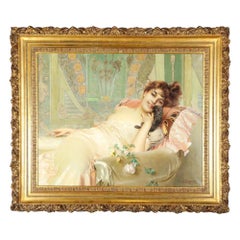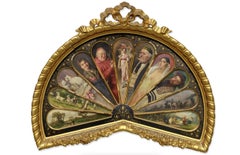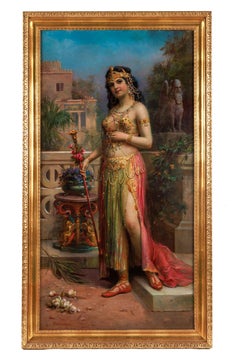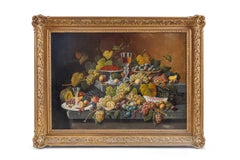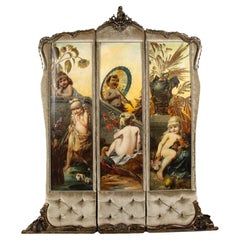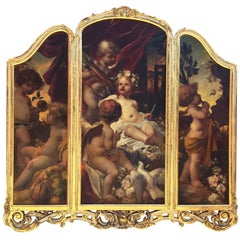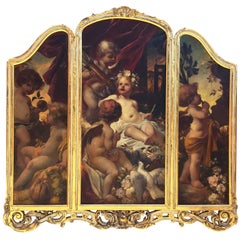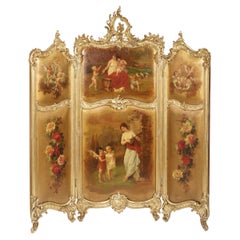Items Similar to Palatial and Opulent Belle Epoque Giltwood & Oil on Canvas Three-Panel Screen
Video Loading
Want more images or videos?
Request additional images or videos from the seller
1 of 22
Ferdinand Wagner IIPalatial and Opulent Belle Epoque Giltwood & Oil on Canvas Three-Panel Screen
$125,000
£94,711.21
€108,673.61
CA$175,895.18
A$193,357.19
CHF 101,619.67
MX$2,348,060.53
NOK 1,267,679.84
SEK 1,201,037.51
DKK 811,058.61
About the Item
A Palatial and Opulent Belle epoque giltwood & oil on canvas three-panel screen, circa 1890.
"Allegory of Youth"
Comprising of three exquisite hand-painted triptych oil on canvas panels of cherubs and putti amongst a peacock, all by Ferdinand Wagner II (German, 1847-1927).
Each panel depicting different playful and joyous scenes of putti and cherubs.
All three-in-one panels within individually carved giltwood and upholstered frames. One panel signed at the lower left: Ferd.Wagner.
A truly magnificent and one of a kind piece, perfect for any room in the home.
Overall: 101" high 85" wide x 5" deep
Very good condition. Ready to place.
Ferdinand Wagner II (German, 1847-1927) was the son of Passau Ferdinand Wagner Senior, a teacher at a vocational art school who began training him professionally at a young age. After traveling to Italy in 1867-1868, he continued with his art studies at The Munich Academy of Arts led by Peter Von Cornelius and Julius Schnorr Von Carolsfeld. Wagner II was influenced by the Munich School of master painters and by his art teacher, Karl von Piloty, who had been teaching at the Munich Art Academy since 1856. Piloty’s approach to historical paintings was influenced by the French art academic Paul Delaroche and by the fine artworks by Rubens and the Venetians.
After his return to Germany he was commissioned to decorate the former the Tenormayer Wine Tavern in Munich, subsequently he received numerous other commissions as a decorator. Ferdinand Wagner II wall paintings and ceiling frescos attracted the attention from the Munich City Hall and he was commissioned to decorate the cellar and at the German Theatre. He also decorated the dining room at The Drachenburg in the Ko¨nigswinter on the Rhine, the Cafe´ of Roth and Luitpold in Munich and The Tivoli Restaurant in London. Between 1890 and 1891 he was comissioned numerous art works for the "Prince Bismarck" Steamboat. In Passau he created works at the town's City Hall. Between 1892 and 1916 he worked continuously decorating the Castle Ratibor by Roth where in 1894 he painted it's main artwork "The Triumph of Aphrodite". Amongst other works, in 1891 he decorated the facade at The Schwyz City Hall, in 1895 the Grand Hall ceiling fresco at the Castle Bueckeburg's, in 1897 the decoration of the large dining hall at the Famous Munich Hofbra¨uhaus and in 1899 he was commissioned to decorate the tower hall of the newly built Hamburg City Hall. In Passau, Ferdinand Wagner II was awarded numerous honors where, in 1887, he was named an Honorary Citizen, the Ferdinand-Wagner-Straße Street was named after him and the "Ferdinand Wagner Hall" at the Town's City Hall was named after him as well.
- Creator:Ferdinand Wagner II (1847 - 1927, German)
- Dimensions:Height: 101 in (256.54 cm)Width: 85 in (215.9 cm)Depth: 5 in (12.7 cm)
- Medium:
- Movement & Style:
- Period:
- Condition:
- Gallery Location:Queens, NY
- Reference Number:1stDibs: LU115129831532
About the Seller
5.0
Platinum Seller
Premium sellers with a 4.7+ rating and 24-hour response times
Established in 1980
1stDibs seller since 2019
15 sales on 1stDibs
- ShippingRetrieving quote...Shipping from: Queens, NY
- Return Policy
Authenticity Guarantee
In the unlikely event there’s an issue with an item’s authenticity, contact us within 1 year for a full refund. DetailsMoney-Back Guarantee
If your item is not as described, is damaged in transit, or does not arrive, contact us within 7 days for a full refund. Details24-Hour Cancellation
You have a 24-hour grace period in which to reconsider your purchase, with no questions asked.Vetted Professional Sellers
Our world-class sellers must adhere to strict standards for service and quality, maintaining the integrity of our listings.Price-Match Guarantee
If you find that a seller listed the same item for a lower price elsewhere, we’ll match it.Trusted Global Delivery
Our best-in-class carrier network provides specialized shipping options worldwide, including custom delivery.More From This Seller
View AllH. Guérault (French, 19th/20th Century) "The Little Prince" Oil on Canvas
Located in Queens, NY
Exquisite Quality French Art Nouveau oil on canvas painting of an elegant lady and pup, titled "The Little Prince" / "Le Dauphin no. 51" (on exhibition labe...
Category
Late 19th Century Art Nouveau Figurative Paintings
Materials
Canvas, Oil
11 Oil Painting Panels in a Majestic Fan Shape, Featuring Isidor Kaufmann
Located in Queens, NY
A Rare and Important Treasure: 11 Oil Painting Panels in a Majestic Fan Shape
Signed by Significant 19th-Century Austrian Artists, Featuring Isidor Kaufmann
A magnificent and unique artistic achievement, this rare and important assemblage of 11 oil painting panels forms a majestic fan shape, uniting the work of significant 19th-century Austrian artists in a singular, breathtaking display. Each oil on panel is signed by the artist, showcasing a rich variety of subjects—ranging from evocative landscapes to compelling portraits—all rendered in the refined and masterful techniques characteristic of the era.
Bringing together the talents of Isidor Kaufmann, Adolf Kaufmann, Carl Reichert, Emma (Edle von Seehof) Müller, Ernst Novak, Johann Hamza...
Category
19th Century Portrait Paintings
Materials
Oil
Emanuel Oberhauser (Austrian, 1854 - 1919) Full Length "Orientalist Queen" Oil
By Emanuel Oberhauser
Located in Queens, NY
Emanuel Oberhauser (Austrian, 1854 - 1919) An Exceptional quality full length oil on canvas painting of a Young Orientalist Queen / Odalisque. 19th ...
Category
19th Century Portrait Paintings
Materials
Oil
An Exceptional Two-Tiered Fruit Still Life Oil Painting, by Mary Mellen, C. 1850
Located in Queens, NY
Mary Blood Mellen (American Female Artist, 1819-1882)
A Large and Exceptional Two-Tiered Fruit Still Life Oil on Canvas Painting, circa 1850
Signed lower right: Mellen
Inscribed possibly by the artist's hand on the stretcher bar: To be sent to Sowle & Ward's for Miss C. A. Rice
This sumptuous two-tier display of fruit and elegant glassware is the largest and most ambitious still-life painting known to have been produced by Mary Blood Mellen (1819-1882), an American Female artist best known for her luminous marines strongly indebted to the style of Fitz Henry Lane. Indeed, still lifes from her hand are extremely rare. The present work is very close to the style of still life popularized by the Prussian-American artist Severin Roesen (1805-1882) who specialized in the genre during the middle decades of the nineteenth century and is signed as Roesen sometimes signed his own efforts, at lower right, as a curly trompe-l'oeil grape tendril, which reads in this case "Mellen."
Until quite recently, Mary Blood Mellen was described in histories of American art exclusively as a copyist, notably of Lane. But as more research into her life and work has been undertaken, that picture of her achievement has been substantially revised and refined. Mellen was, in fact, Lane's pupil, and a copyist of his work. But owing to the skill she developed working with him in his Gloucester studio, Mellen evolved into an artist in her own right, working alongside him as a sometimes collaborator on the same pictures-their work often being so similar that it is frequently difficult to tell it apart. Mellen and Lane also formed a fast friendship. She also painted ravishing moonlit marine compositions of her own invention, as well as nostalgic New England landscapes in her own style.
At a 2007 scholarly conference held at Spanierman Galleries in New York in conjunction with the exhibition, "Fitz Henry Lane and Mary Blood Mellen: Old Mysteries and New Discoveries" held at the Cape Ann Historical Museum, there was a small footnote to the effect that Mellen was also known to have copied works by other artists, including Alfred Bricher and Severin Roesen (See Report on Scholars' Gathering in Association with the Exhibition "Fitz Henry Lane & Mary Blood Mellen: Old Mysteries and New Discoveries," 2007, p. 5.) How she encountered works by those figures, particularly Roesen who was active primarily in New York City and eastern and central Pennsylvania, remains speculative. Certainly, copying other artists' work was an aspect of nearly every artist's training at the time Mellen was active as a painter.
Mellen was born in Vermont in 1819 to parents who were originally from Massachusetts. She was educated at the Quaker's Fryville Seminary in Bolton, Massachusetts, where she would have learned artistic crafts including theorem painting...
Category
19th Century Still-life Paintings
Materials
Oil, Canvas
Emanuel Oberhauser “Mermaids and Nymphs” An Exceptional Oil on Canvas Painting
By Emanuel Oberhauser
Located in Queens, NY
Emanuel Oberhauser (Austrian 1854 - 1919) “Mermaids, Neptune and Sea Water Nymphs”
An Exceptional Oil on Canvas Painting painted circa 1885.
Mas...
Category
19th Century Rococo Figurative Paintings
Materials
Oil
"The Walk Back Home" A Monumental "Exhibition" Painting by Carl Lasch
Located in Queens, NY
Carl Lasch (1822-1888 German) "The Walk Back Home" A Monumental Exhibition Painting,
Oil on canvas laid to masonite in original gilt-wood frame.
...
Category
19th Century Portrait Paintings
Materials
Masonite, Oil
You May Also Like
Palatial and Opulent Belle Epoque Giltwood & Oil on Canvas Three-Panel Screen
By Ferdinand Wagner II 1
Located in Queens, NY
A Palatial and Opulent Belle epoque giltwood & oil on canvas three-panel screen, circa 1890.
"Allegory of Youth"
Comprising of three exquisite hand-painted triptych oil on canvas panels of cherubs and putti amongst a peacock, all by Ferdinand Wagner II (German, 1847-1927).
Each panel depicting different playful and joyous scenes of putti and cherubs.
All three-in-one panels within individually carved giltwood and upholstered frames. One panel signed at the lower left: Ferd.Wagner.
A truly magnificent and one of a kind piece, perfect for any room in the home.
Overall: 101" high 85" wide x 5" deep
Very good condition. Ready to place.
Ferdinand Wagner II (German, 1847-1927) was the son of Passau Ferdinand Wagner Senior, a teacher at a vocational art school who began training him professionally at a young age. After traveling to Italy in 1867-1868, he continued with his art studies at The Munich Academy of Arts led by Peter Von Cornelius and Julius Schnorr Von Carolsfeld. Wagner II was influenced by the Munich School of master painters and by his art teacher, Karl von Piloty, who had been teaching at the Munich Art Academy since 1856. Piloty’s approach to historical paintings was influenced by the French art academic Paul Delaroche and by the fine artworks by Rubens and the Venetians.
After his return to Germany he was commissioned to decorate the former the Tenormayer Wine Tavern in Munich, subsequently he received numerous other commissions as a decorator. Ferdinand Wagner II wall paintings and ceiling frescos...
Category
Antique 19th Century German Belle Époque Screens and Room Dividers
Materials
Canvas, Upholstery, Giltwood, Paint
Charming 19th Century Oil on Canvas Triptych of Cherubs 'An Allegory to Spring'
Located in LA, CA
Ferdinand Wagner II (German, 1847-1927) A very fine and charming triptych group of three oil on canvas laid on board titled "An Allegory to Spring" each panel depicting different pla...
Category
Late 19th Century Academic Figurative Paintings
Materials
Oil
German 19th Century Oil on Canvas Triptych of Cherubs by Ferdinand Wagner II
By Ferdinand Wagner II 1
Located in Los Angeles, CA
Ferdinand Wagner II (German, 1847-1927) A very fine and charming triptych group of three oil on canvas laid on board titled "An Allegory to Spring" each panel depicting different playful and joyous scenes of putti and a cherubs reminiscent of spring, love and peace. The center panel depicting a seated putto, crowned with flowers, a standing putto behind him holding a sack of arrows and a seated cherub facing him next to a watchful peace dove on top resting of a flower bouquet. The left panel depicting a seated putto next to a standing putto with a freshly harvested apple. The right side panel depicting a standing cherub holding a fig branches with leaves. All three-in-one panels within individually carved giltwood frames. All panels signed at the lower left: Ferd. Wagner, circa 1890.
Ferdinand Wagner II (German, 1847-1927) was the son of Passau Ferdinand Wagner Senior, a teacher at a vocational art school who began training him professionally at a young age. After traveling to Italy in 1867-1868, he continued with his art studies at The Munich Academy of Arts led by Peter Von Cornelius and Julius Schnorr...
Category
Antique Late 19th Century German Rococo Revival Paintings
Materials
Canvas, Wood
19th Century 3-Fold Screen with Vernis Martin Panels in the Louis XV Style
By William-Adolphe Bouguereau
Located in London, GB
A three-fold Vernis Martin screen
In the Louis XV Manner
The frame constructed from carved and gilded wood in the Rococo manner, the triptych Vernis Martin panels depicting idyll...
Category
Antique 19th Century French Louis XV Screens and Room Dividers
Materials
Giltwood, Paint
Execptional three leave panel screens giiltwood and tapestry
Located in Los Angeles, CA
Napoleon III screens in gilded wood and tapestry , the carved of this sreens is magnificent .all leaves depicting a scene in garden show a couples dancing representing love ,joy and ...
Category
Antique 1880s French Napoleon III Screens and Room Dividers
Materials
Tapestry, Giltwood
French Renaissance Revival Folding Three-Panel Screen with Hand-Painted Motifs
Located in Atlanta, GA
A French Renaissance Revival folding three-panel screen with hand-painted Grotesque motifs and inset glass from the 19th century. Reminding us of motifs that one would see on the ceiling of the Uffizi gallery in Florence, this French painted screen...
Category
Antique 19th Century French Renaissance Revival Screens and Room Dividers
Materials
Glass, Wood, Canvas
More Ways To Browse
Belle Epoque Art
Belle Epoque Paintings
Munich School
Belle Epoque Oil Painting
Wagner Painted
Antique Wall Fresco
Cherub Panel
French Hand Painted Three Panel Wall Screen
Palatial Oil Paintings
Itamar Siani
Ivanyi Grunwald Bela
J Gaston
Jackie Kennedy Painting
Jacques Deveau
James G Davis
Jan Swiderski
Jan Van Der Heyden
Jean Frederic Schall
